|
|
|
Sort Order |
|
|
|
Items / Page
|
|
|
|
|
|
|
| Srl | Item |
| 1 |
ID:
131492


|
|
|
|
|
| Publication |
2014.
|
| Summary/Abstract |
Among scholars, delegation of power to the US president in 1934 is widely believed to have been a necessary requisite for tariff reductions in ensuing years. According to conventional wisdom, delegation to the president sheltered Congress from constituent pressure thereby facilitating the opening of the US economy and the emergence of the United States as a world power. This article suggests a revision to our understanding of just how that occurred. Through a close study of the US tariff schedule between 1928 and 1964, focusing on highly protected products, we examine which products were subject to liberalization and at what time. After 1934, delegation led to a change in trade policy, not because Congress gave up their constitutional prerogative in this domain but because presidents were able to target the potential economic dislocation that derives from import competition to avoid the creation of a congressional majority willing to halt the trade agreements program.
|
|
|
|
|
|
|
|
|
|
|
|
|
|
|
|
| 2 |
ID:
127778
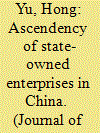

|
|
|
|
|
| Publication |
2014.
|
| Summary/Abstract |
The state sector still plays an important role in China's economy. One of the key development phenomena characterizing the Chinese economy is the rapid ascendency of state-owned enterprises (SOEs) and the resurgence of the state. The strength of China's SOEs is projected in the centrally administrated state-owned enterprises (CSOEs). They are the backbone of the national economy, spearheading national economic development and Beijing's 'going-out' strategy. The CSOEs have expanded their reach and increased their power, domestically and globally. In seeking to boost local GDP growth, the eastern provinces in China have joined the western provinces in a fierce contest to attract investment from SOEs. Nevertheless, the rapid ascendency of the SOEs has brought many negative consequences for China's economic, social and political development by causing conflict with the market-oriented development direction of Chinese economic reform and hindering fair competition between state-owned and non-state-owned enterprises.
|
|
|
|
|
|
|
|
|
|
|
|
|
|
|
|
| 3 |
ID:
132400
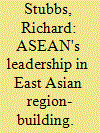

|
|
|
|
|
| Publication |
2014.
|
| Summary/Abstract |
Despite none of its members being a major economic or military power, the Association of Southeast Asian Nations (ASEAN) has played a leading role in building East Asia's regional institutions. In exploring this apparent puzzle, the analysis reviews the literature on state leadership at the regional and international level, asks why the region's major powers ceded leadership on the question of regional institution building to ASEAN, and assesses the consequences for East Asia's regional architecture of ASEAN's leadership role in institution-building. The conclusion is that leadership at the state level entails a state, or a group of states, proposing, executing and getting others to agree on a course of action to deal with a specific problem or challenge. The analysis also underscores the point that, while ASEAN has been the leader in East Asian institution-building, the Association and its members should not automatically be expected to play a leadership role on all issues preoccupying the region.
|
|
|
|
|
|
|
|
|
|
|
|
|
|
|
|
| 4 |
ID:
092145
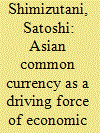

|
|
|
|
|
| Publication |
2009.
|
| Summary/Abstract |
This article proposes an open and multi-tiered economic and financial system with introduction of an Asian common currency as a form for the Post Bretton-Woods arrangement. After reviewing the role of the incumbent international economic system, the reasons that an Asian common currency could contribute to consolidate the new international system is discussed bearing in mind the new environment of the relative decline of economic power of the United States and relative rise of economic power of China. Then a "roadmap" for the introduction of an Asian common currency is provided and how to proceed steadily on the long road towards the introduction of the new currency is argued. In particular, it is emphasized, as the world looks for a new direction, that strong political collaboration in the region is required precisely now with a view to making this a reality.
|
|
|
|
|
|
|
|
|
|
|
|
|
|
|
|
| 5 |
ID:
134047
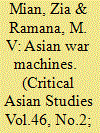

|
|
|
|
|
| Publication |
2014.
|
| Summary/Abstract |
The South Asian security landscape is increasingly dominated by a complex four-way dynamic between India, Pakistan, China, and the United States. The stresses and strains of the relationships between these states directly affect the prospects for peace and prosperity for almost half of humanity. This article describes some of the military contours of this landscape, with a focus on strategic postures, weapon acquisitions, and the role of nuclear weapons. It maps the India-Pakistan arms race over the past decade, the economic constraints on the two states, the role of China and the United States as weapons suppliers, and the risk and consequences for nuclear war. The authors then look at India's relationship with China, which is marked by both cooperation and competition, and the rise of China as a close military, political, and economic ally of Pakistan. While the United States has had long-standing cooperative relationships with both India and Pakistan, these relationships have been undergoing major shifts over the last two decades. U.S. concerns about China's increasing military and economic power have also intensified over this period as well. Of particular significance has been the effort to create a U.S.-India strategic partnership to balance and contain a rising China, which may become a central feature of the emerging global order. This article also offers a brief overview of what is publicly known about the nuclear arsenals of the four countries, ongoing production of weapons-usable fissile materials in Pakistan and India, as well as the race to build longer-range missiles.
|
|
|
|
|
|
|
|
|
|
|
|
|
|
|
|
| 6 |
ID:
127211
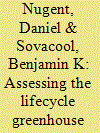

|
|
|
|
|
| Publication |
2014.
|
| Summary/Abstract |
This paper critically screens 153 lifecycle studies covering a broad range of wind and solar photovoltaic (PV) electricity generation technologies to identify 41 of the most relevant, recent, rigorous, original, and complete assessments so that the dynamics of their greenhouse gas (GHG) emissions profiles can be determined. When viewed in a holistic manner, including initial materials extraction, manufacturing, use and disposal/decommissioning, these 41 studies show that both wind and solar systems are directly tied to and responsible for GHG emissions. They are thus not actually emissions free technologies. Moreover, by spotlighting the lifecycle stages and physical characteristics of these technologies that are most responsible for emissions, improvements can be made to lower their carbon footprint. As such, through in-depth examination of the results of these studies and the variations therein, this article uncovers best practices in wind and solar design and deployment that can better inform climate change mitigation efforts in the electricity sector.
|
|
|
|
|
|
|
|
|
|
|
|
|
|
|
|
| 7 |
ID:
126586


|
|
|
|
|
| Publication |
2013.
|
| Summary/Abstract |
Using the 'achievement index', a country's relative size of gross domestic product divided by its relative size of population, I argue that the high-achieving position of the West, as a structural distortion, has been a principal source of instability in the modern international system. Rather than being just unsatisfied great powers, large high achievers and stagnant low achievers engage in hegemonic and counter-hegemonic warfare, respectively. Both hierarchy and balancing systems are structurally more stable if they are 'natural' and less stable if they are 'unnatural', with being natural defined as an achievement index of 1. The rise of the rest constitutes a long-term trend back to nature, beginning to flatten the heretofore skewed international structure, which lessens one source of modern system-level instability. With a much larger share of world population, China cannot rise to the same relative height as the West that rose with a much smaller share of the population. China's rise is thus unlikely to repeat the past experience of the rising West.
|
|
|
|
|
|
|
|
|
|
|
|
|
|
|
|
| 8 |
ID:
131995


|
|
|
|
|
| Publication |
2014.
|
| Summary/Abstract |
Within the scholarly debate on the current power transition in the international system, particular importance is attached to China's economic rise and the global shifts it is bringing forth in material primacy. A thorough understanding of these shifts in the relative distribution of power, however, requires leaving the narrow path of material capabilities and looking at normative accounts as well. Taking up this challenge, the article focuses on the political dimension of China's rise by exploring the country's alignment with South American governments along two dimensions: the convergence of their foreign policy ideas and the provision of diplomatic links facilitating their cooperation and coordination in global politics. The empirical analysis depicts a nascent global agenda forming between China and certain South American countries and shows that, along with growing levels of foreign policy compatibility, China has also advanced its diplomatic inroads into the region, particularly at the level of bilateral relations. Taking these developments as a whole, it is suggested that China has gained international attraction in terms of its visions of global order and as a potential political partner throughout the region. The article concludes with a discussion of the findings in light of the ongoing relative shifts in the distribution of global power beyond material primacy, and the prospects for China's further political rise.
|
|
|
|
|
|
|
|
|
|
|
|
|
|
|
|
| 9 |
ID:
131700
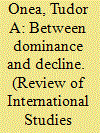

|
|
|
|
|
| Publication |
2014.
|
| Summary/Abstract |
This article investigates the role of status considerations in the response of dominant powers to the rise of emergent states. Accordingly, the hypothesis explored is that dominant actors are prone to fear that they will lose their upper rank, and, due to this status anxiety, resist the efforts of emergent powers to match or surpass them. The article begins by explaining why political actors deem status important and puts forward a theory of status anxiety in world politics. The more pronounced is this anxiety across status dimensions (economic and military capabilities as well as prestige), the higher the likelihood of conflict. This argument is then tested against competing theories of dominant power behaviour in two cases: the relations between France and Britain from the 1740s to Napoleon and those between Britain and Germany from the 1880s to World War One.
|
|
|
|
|
|
|
|
|
|
|
|
|
|
|
|
| 10 |
ID:
130610
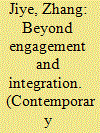

|
|
|
|
|
| Publication |
2014.
|
| Summary/Abstract |
As part of its new strategy of "retuming to the Asia-Pacific region", the A Obama administration has adopted some tough economic policies towards China, notably promoting the Trans-Paci?c Partnership (TPP) and attempting to establish new rules of international trade and investment aimed at strengthening economic ties with other Western countries through the Trans-Atlantic Trade and Investment Partnership Agreement(TTlP ), both of which tend to compress the geopolitical space for China's economic rise. The administration is also using a 'green barrier' to suppress the development of China's high-tech industry, and using economic diplomacy and investment restrictions against Chinese state-owned enterprises. This paper seeks to examine and analyze the causes of shifts in the U .S. economic strategy towards China.
|
|
|
|
|
|
|
|
|
|
|
|
|
|
|
|
| 11 |
ID:
127869


|
|
|
|
|
| Publication |
2014.
|
| Summary/Abstract |
As the President of the Office of Competition and Consumer Protection refused to approve a government initiated takeover in the Polish power sector and the Court of Competition and Consumer Protection did not make a ruling on that case, the takeover was finally prohibited. In this context, the main aim of this paper is to carry out a quantitative analysis of the impact of the takeover in question on electricity prices and quantities, consumer and producer surpluses, dead weight loss and emissions. The scope of the study covers the Polish power generation sector and the analysis was carried out for 2009. A game theory-based electricity market equilibrium model developed for Poland was applied. The model includes several country-specific conditions, such as a coal-based power generation fuel-mix, a large share of biomass co-combustion, etc. For the sake of clarity, only four scenarios are assumed. The paper concludes that the declared synergy savings did not compensate for the increase in dead weight loss and the transfer of surplus from consumers to producers caused by increased market power.
|
|
|
|
|
|
|
|
|
|
|
|
|
|
|
|
| 12 |
ID:
110617
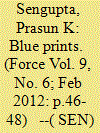

|
|
|
| 13 |
ID:
140627
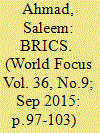

|
|
|
|
|
| Summary/Abstract |
The leaders of the BRICS countries have demonstrated that the establishment of the BRISC bank is a direct blow to the International financial system and it has also remarkably shown the building of the new global economic order that will bring middle economic powers to the global economic affairs. Things have changed rapidly, and the BRICS bank is going to play a pivotal role in financial policies of the developing countries. Moreover, the BRICS countries have indicated to the western countries and especially to the United States of America that nothing is permanent and gone are the days of American dollar; now they have their own currency for trade and exchange among the member countries. This step clearly shows a dent on American dollar hegemony in the world and China’s Yuan is going to rise gradually at the global level. Nevertheless, the fear of China’s dominance among its members can alter the new global economic order and BRICS countries should not give the opportunity to the western countries to play a “divide and rule policy” against its members. They must have faith in each other and can resolve their problems at the bilateral level as well as multi-lateral level.
|
|
|
|
|
|
|
|
|
|
|
|
|
|
|
|
| 14 |
ID:
124847


|
|
|
|
|
| Publication |
2013.
|
| Summary/Abstract |
A generally underappreciated shift in U.S. engagement with the global macroeconomic order, accelerated by the global financial crisis, has complicated managing the dollar as a global currency and placed new, politically unfamiliar constraints on U.S. power.
|
|
|
|
|
|
|
|
|
|
|
|
|
|
|
|
| 15 |
ID:
133005


|
|
|
|
|
| Publication |
2014.
|
| Summary/Abstract |
When Nigel Farage and his crop of UKIP MEPs turned their backs on a chamber-orchestra performance of Beethoven's Ninth Symphony at the summer opening of the European Parliament, even sympathisers winced.
As political point scoring went, presenting so loutish a cold shoulder to a masterpiece of western music showed a jarring lack of courtesy, especially since those involved were not, it seemed, planning to reject the attached salary.
It was a sorry protest in that it showed a brazen disregard not merely for 'EU regulations' but for one of the grand peaks of European culture. So far as Britain is concerned, people - and ideas - have been drifting from Europe since the passing of the Ice Age. Not all were nice; not all were brilliant; not all were welcome. But Britain's population is a rich old stew of Iberian, Celtic, Roman, Anglo-Saxon, Danish and Norman folk - even before we include the more varied migrations of the past hundred years. -
|
|
|
|
|
|
|
|
|
|
|
|
|
|
|
|
| 16 |
ID:
144030
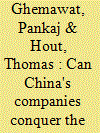

|
|
|
|
|
| Summary/Abstract |
Despite China’s recent economic struggles [2], many economists and analysts argue that the country remains on course to overtake the United States and become the world’s leading economic power someday soon. Indeed, this has become a mainstream view [3]—if not quite a consensus belief—on both sides of the Pacific. But proponents of this position often neglect to take into account an important truth: economic power is closely related to business power, an area in which China still lags far behind the United States.
|
|
|
|
|
|
|
|
|
|
|
|
|
|
|
|
| 17 |
ID:
131416
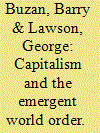

|
|
|
|
|
| Publication |
2014.
|
| Summary/Abstract |
The two-centuries-old hegemony of the West is coming to an end. The 'revolutions of modernity' that fuelled the rise of the West are now accessible to all states. As a consequence, the power gap that developed during the nineteenth century and which served as the foundation for a core-periphery international order is closing. The result is a shift from a world of 'centred globalism' to one of 'decentred globalism'. At the same time, as power is becoming more diffuse, the degree of ideological difference among the leading powers is shrinking. Indeed, because all Great Powers in the contemporary world are in some form capitalist, the ideological bandwidth of the emerging international order is narrower than it has been for a century. The question is whether this relative ideological homogeneity will generate geo-economic or geopolitical competition among the four main modes of capitalist governance: liberal democratic, social democratic, competitive authoritarian and state bureaucratic. This article assesses the strengths and weaknesses of these four modes of capitalist governance, and probes the main contours of inter-capitalist competition. Will the political differences between democratic and authoritarian capitalists override their shared interests or be mediated by them? Will there be conflicting capitalisms as there were in the early part of the twentieth century? Or will the contemporary world see the development of some kind of concert of capitalist powers? A world of politically differentiated capitalisms is likely to be with us for some time. As such, a central task facing policy-makers is to ensure that geo-economic competition takes place without generating geopolitical conflict.
|
|
|
|
|
|
|
|
|
|
|
|
|
|
|
|
| 18 |
ID:
128418
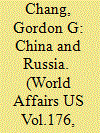

|
|
|
|
|
| Publication |
2014.
|
| Summary/Abstract |
Economic weakness has driven Vladimir Putin's Russia into a "strategic entente" with the Chinese, who in turn get a powerful global ally. The alliance could prove formidable for the West.
|
|
|
|
|
|
|
|
|
|
|
|
|
|
|
|
| 19 |
ID:
142810
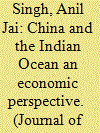

|
|
|
| 20 |
ID:
109188
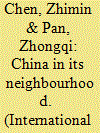

|
|
|
|
|
| Publication |
2011.
|
| Summary/Abstract |
China's regional policy is mainly centred on its efforts to forge a friendly, stable and prosperous neighbourhood. To achieve this end, China has developed an approach combining both partnership bilateralism and tailored regional multilateralism. By and large, China does not consider its neighbourhood as a whole and has been very cautious and hesitant to engage in overarching 'region-building'. China has relied mostly on soft (attractive) use of power, particularly economic power, supported by cultural and assurance diplomacy, even though diplomatic and economic coercion have been exercised occasionally. China has once again become the biggest economy in Asia. Yet, neither the new power configuration in Asia nor China's own ambitions point to a return to the old 'Middle Kingdom' with China holding a dominant position in its neighbourhood. China will most probably continue to see itself as a self-restrained regional power in the foreseeable future.
|
|
|
|
|
|
|
|
|
|
|
|
|
|
|
|
|
|
|
|
|